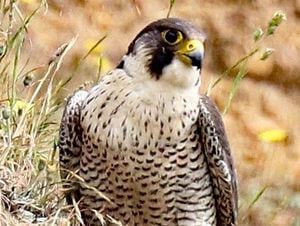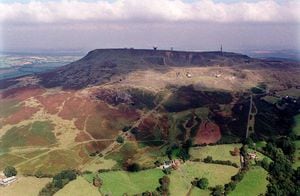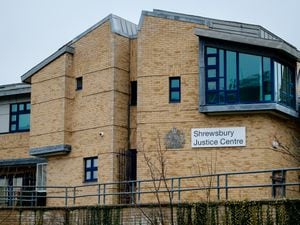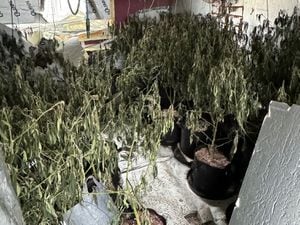Peregrine falcons dead after killers smear pigeons with poison as bait at Shropshire beauty spot
Rare birds of prey have been poisoned at a Shropshire beauty spot in the latest in a series of attacks by bird-killers whom wildlife campaigners say are bringing "shame" to the village of Clee Hill.

And Shropshire Peregrine Group has issued a warning that dog walkers and animals could be at risk as a result of lingering toxin on the moorland at Titterstone Clee Hill.
"We are shocked that it's happened again," said John Turner, who chairs the group dedicated to the falcons which have been making a slow and fragile return to Shropshire.
The falcon killers used tethered live pigeons smeared with poison as bait.
"The deadly poison being used is a danger to people walking their dogs and to animals in the area and somehow we are going to have to inform Defra to get the place decontaminated as it should not be scattered in the countryside like it has been and is contaminating the moorland where these pigeons were found.
"On Wednesday evening another poisoned pigeon was found along with a dead fox which had eaten it.
"We know who is responsible, and local people know who is responsible. I urge local residents of Clee Hill to call out the individuals responsible for these crimes, many of whom are well known in the area, and provide the police with information about their criminal activities which are bringing shame to the village."

Mr Turner said the latest attack targeted at Clee Hill's only pair of nesting peregrines had happened on May 1. The pair had returned there in early April and was incubating a clutch of eggs.
He said: "It [the female peregrine] was found by the site warden on Saturday morning. There was the body of a poisoned pigeon very near the dead female peregrine. The male will have been killed as well but we have not recovered the body yet.
"We think this is a repeat of what happened four years ago in 2017. We thought we had put a stop to it. We have had at least a dozen peregrines poisoned since 2010 – we have lost about a quarter of the Shropshire population of about 40 peregrines."
Mr Turner said the attack was a wildlife crime and there was a reward of £1,000 for information leading to the conviction of the culprits.
"The maximum penalty for killing or hurting a peregrine falcon is a fine of £5,000 or six months in prison," he added.
"They use live pigeons as bait. They paint poison on the feathers, tie it to a stake, and put it near where the peregrines are nesting. In this case they tethered two pigeons in the area. It is a very slow, agonising death for the peregrines.
"It's got to stop. It's a disgraceful episode of wildlife crime and persecution of these birds of prey."
Investigating
Mr Turner said that for three years the nesting pair at Clee Hill had nested inside the relative safety of the working quarry, but this year had nested on a cliff site.
Both West Mercia Police wildlife crime unit and the RSPB are investigating.
Mr Turner added: "The manner in which these killings are carried out points to the involvement of some individuals who are openly campaigning for the removal of peregrine falcons and other birds of prey from some areas of countryside. These killings are well planned and executed, using similar methods on each occasion."
Police are appealing for information.
Pc Grant of West Mercia Police said in a statement: “The body [of the the female peregrine] was recovered together with a pigeon that had been used as bait. The male bird has not been found, but is also believed to have been killed. The baited pigeon at the scene indicates that poison was used to kill both birds. The incident is currently under investigation by both West Mercia Police and RSPB Investigations.
“Peregrine falcons are specifically protected under the Wildlife & Countryside Act 1981, and the maximum penalty for killing or deliberately injuring a protected species is a fine of £5,000 and six months imprisonment.
"We are asking members of the public walking on Clee Hill common with children and pets to be aware and to take care that poison bait may still be around and not to touch any dead animals that they may come across if they do see any such animals or anything suspicious, to please call police.
“If anyone has any information regarding this incident please contact the police on 101 and quote incident number 258i of 1 May 2021 or contact us via our ‘Tell us about’ section on our website.”
Alternatively, contact Crimestoppers anonymously on 0800 555111 or at crimestoppers-uk.org





